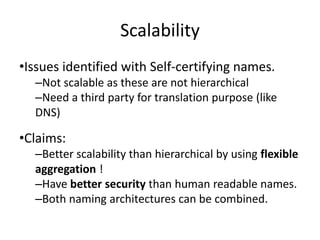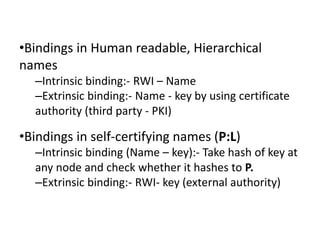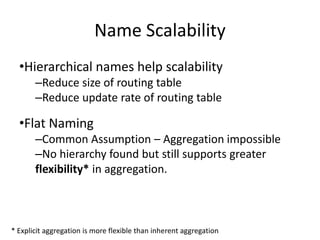Naming in content_oriented_architectures [repaired]
- 1. Naming in Content-Oriented Architectures Paper by: Ali Ghodsi et al. Pressented by: Haroon Rashid
- 2. •Naming Types –Self certifying, flat naming (Cryptographic based). –User friendly, hierarchical naming. •Issues –Scalability –Security –Flexibility
- 3. Scalability •Issues identified with Self-certifying names. –Not scalable as these are not hierarchical –Need a third party for translation purpose (like DNS) •Claims: –Better scalability than hierarchical by using flexible aggregation ! –Have better security than human readable names. –Both naming architectures can be combined.
- 5. Entities for establishing security •Real world Identity (RWI) – principal for data. •Name –Used for fetching the data –Provided by principal •Public key –Each principal associated with private/public key –Used for authentication purposes
- 6. Bindings •RWI – Name: Helps in identifying the principal. •RWI – Public key: Only intended principal could claim to be the principal of data. •Public key – Name: Associating key helps in verifying the provenance of data. •Bindings are transitive – proving any two of them implies third one.
- 7. •Bindings in Human readable, Hierarchical names –Intrinsic binding:- RWI – Name –Extrinsic binding:- Name - key by using certificate authority (third party - PKI) •Bindings in self-certifying names (P:L) –Intrinsic binding (Name – key):- Take hash of key at any node and check whether it hashes to P. –Extrinsic binding:- RWI- key (external authority)
- 8. Comparison Human readable, Hierarchical (CCN) •More useful. •Remain unchanged as cryptographic algos evolve. •Name - RWI binding not tight, e.g., acronym ICSI. •Tiny URLs obliterate Name – RWI binding Self-certifying, Flat (DONA) • Usability - Difficult to remember such names •Require careful engineering to retain names as algos. evolve.
- 9. Name Scalability •Hierarchical names help scalability –Reduce size of routing table –Reduce update rate of routing table •Flat Naming –Common Assumption – Aggregation impossible –No hierarchy found but still supports greater flexibility* in aggregation. * Explicit aggregation is more flexible than inherent aggregation
- 10. Explicit aggregation •Deepest match working ?? • Fetch Terms: -Principal creates various fetch terms corresponding to different third party aggregates. - Like outsourcing of content dissemination. - Seems much like of CDN.
- 11. Naming and Flexibility •Human friendly naming require PKI for binding keys to names. –Require universal agreement on the root trust authority. • self certifying naming require external authority for binding of keys to RWI.










